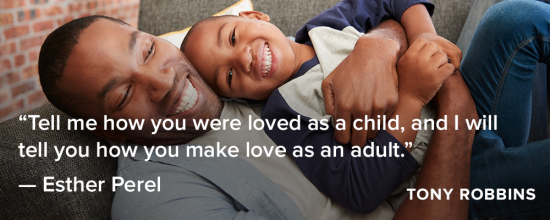This piece was specially written for the Tony Robbins blog by world–renowned couples’ therapist Esther Perel.
A few weeks ago, I had the honor of sitting down with my dear friend Tony Robbins for a conversation about my new book, The State of Affairs. Tony and I have worked together since 2004 and we both believe that the quality of our relationships determines the quality of our lives, so we knew we were going to have fun, but we surprised even ourselves. We talked for more than two hours.
Tony turned it all into a podcast which I encourage you to listen to here.
We touched the full spectrum of relationship questions that keep people up at night: What is so different about relationships today? Why does modern love seem so damn hard? How do we keep passion alive? Why do people cheat? Even those in happy marriages? How can you avoid an affair? When trust is broken, can it be healed? What can we learn from infidelity? How can you turn a crisis into an opportunity? What do the French think about infidelity? (A quick reminder: I am not French.)
But, perhaps most importantly: Where do we learn to love and how?
This is one of my favorite questions.
As a person that speaks nine languages, I’ve learned how important it is to practice the basic verbs. These are the first verbs we learn for speech and, often, they are the first we learn in love. The seven I like to pay special attention to are:
- to ask
- to take
- to receive
- to give
- to share
- to refuse
- to play/imagine
When we learned these verbs as children, some grew strong, others grew weak. We built them into the foundations of our defense mechanisms and our survival strategies; our strengths and our vulnerabilities. This emotional history is also expressed in the physicality of sex. That is why I often say, “tell me how you were loved (as a child), and I will tell you how you make love (as an adult).” All of these verbs come into play when we face the everyday challenges of modern love – and when we face the age-old taboo of infidelity.
I wrote The State of Affairs because we need a new vocabulary and new tools for talking about something that affects up to 80% of people (as the children, the friend, the offspring or the third that completes the triangle). We need new answers to questions like “How can I recover after an affair?” and “How can I affair-proof my marriage?” because the answers right now aren’t adequate: infidelity is one of the top reasons couples divorce in America, and the rate of affairs is rising.
So why am I still talking about verbs? Because the best way to affair-proof a marriage is to build a robust relationship that incorporates all of the parts of yourself – and that’s also one of the stages of recovery after an affair. Many people stray not because they are looking for another partner, but rather because they are looking for another self: one that remembers how to play, to take, to give or to receive. Working on your verbs is not the only answer, but it’s a strong step in the right direction.
We get better at what we do, we become what we repeat. And so if you want to strengthen one of your verbs, do what Tony says in the podcast, “Pick one and make it a focus.” Give it massaging, caring, effort. Build that muscle. Ask yourself: Which is the verb that needs the most stretching for you? Which comes easiest? And which verb do you need to practice now?
And after you’ve done that for a bit, come back here for more conversations about relationships and the future of modern love. We have much more to talk about, including more ways we can work on Rekindling Desire and building relationship resilience. We’re only just getting started.
Esther is an organizational consultant for Fortune 500 companies around the world and the co-founder of Esther Perel Global Media which hosts professional and personal online trainings.



